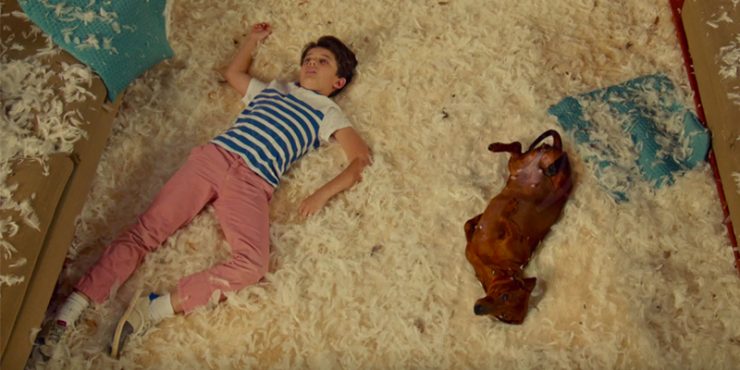This is the Todd Solondz we know so well. Where the return of Welcome to the Dollhouse‘s Dawn Wiener would come packaged haphazardly within an aimless anthology film titled Wiener-Dog. The film is four stories, connected by a nameless dachshund who patters throughout the lives of various depressed people, and what we’re left with is another Solondz meditation on white upper-class ennui. After his two-film punch in the 90’s of Dollhouse and his 1998 masterwork Happiness, it’s seemed like Solondz is struggling to keep the train moving. These diabolical comedies where innocents are taken advantage of and where humanity is displayed as one life-long regret can grow stale, even if Solondz is still able to cobble together solid performances from his ensembles. The various homes that this dachshund resides in includes the aforementioned Dawn Wiener (played now by Greta Gerwig), a veterinary assistant who snatches the dog before its put down; a jaded rich couple (Tracy Letts and Julie Delpy) who get the dog for their son, Remi (Keaton Nigel Cooke), who is in cancer remission; a failed screenwriter turned curmudgeonly college film professor (Danny DeVito); and a recalcitrant grandmother (Ellen Burstyn) receiving visits from her wayward granddaughter (Zosia Mamet). Solondz tries to weave these tales into something coherent, and each story has a moment where it seems like something substantial is being translated, but overallWiener-Dog ends up feeling shabby and without much purpose. There are cheaper ways to tell an audience that life is meaningless and sad. The laughs we get (and we do get legitimate laughs) often come at the expense of the mentally handicapped, racial stereotypes and more than anything else the dog itself. Not a single race or person ever comes off looking particularly good in Solondz’s films, but at least the white people get full lines and something close to a character arc. The performances from DeVito, Delpy and Burstyn are all fantastic, but they feel like they’re from completely different films, conveying completely different feelings, and the sum ends up feeling hollow. Gerwig gives one of those indie performances she’s known to give where she seems to think that getting dressed in wardrobe is all she has to do. A charming “intermission” gets some laughs, but to what end? The Solondz of Happiness is a thing of the past, and there are newer, better directors who understand how to put forth that somber reality of existence that he used to be so expert at. If life is so cruel, why are we made to keep looking at this adorable dog?
Written and Directed by Todd Solondz










